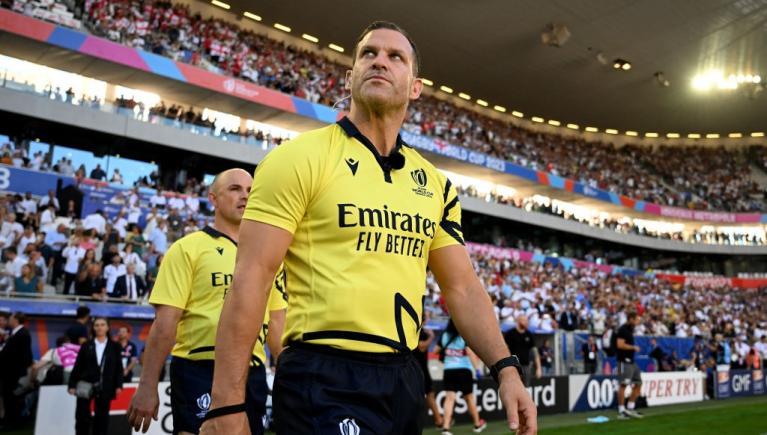'If we can turn the dial': Dickson on the impact of Whistleblowers

Karl Dickson is in a unique position in rugby, having experienced the sport at the highest level as both a player and a referee.
The former Harlequins scrum-half is not the only referee to have been on the other side of the whistle- his World Cup colleague Nic Berry also played for the Reds, Racing 92 and Wasps. But he confessed recently that, as a player, he had no idea what referees go through.
With the launch of World Rugby Studios' Whistleblowers, players, coaches and fans will gain an insight that Dickson never had during his playing career.
The documentary is set to be released on February 1, and sheds light on the life of Dickson and his fellow match officials in France last year.
"As a player, as a No9, obviously you try and referee the game that you think you're looking at," the referee said at the documentary's premiere in London.
"But you actually have no idea what the actual referees go through, what their lifestyles are like, what the behind-the-scenes look like, particularly at a professional level."
Whistleblowers provides an unprecedented look at what match officials go through at a World Cup- the highs and lows of the job, and the rigours of being an elite referee.
Dickson went on to describe how it was a "massive eye-opener" becoming a referee after a playing career that included over 150 appearances for Quins, but something that remains is his love of the game. This passion for the game that he and his colleagues hold, he believes, shines through in the documentary.
"It was a massive eye-opener for me coming into the game," he said. "But I think as well from the film what you get is you see how much we enjoy the game. We love the game. We wouldn't be part of it if we didn't. I think the film does show, obviously, the negative sides to it, but also just how much love we have for each other and for the game of rugby. I think they portray that really well."
This negative side is the abuse that match officials receive, which is laid bare in this warts-and-all production.
Chief Marketing and Content Officer at World Rugby James Rothwell admitted that they did not go into this project with the aim of making a film about social media abuse, but said that it was "very clear that there was a different story to tell".
Whether it is in the stands or online, Dickson said how referees try to block out the abuse they receive, but are inevitably not entirely successful. He said that only with experience can a referee block out this noise.
However, he hopes that Whistleblowers will usher a sea change in how referees are treated.
"It comes with experience and being actually exposed to these situations," the 41-year-old said when asked how he blocks out the external noise.
"You come up with your way of dealing with it, almost blocking out that noise, trying to be with your team.
"You can never truly block it all out. You can hear that in the stadium with the fans, obviously with the players around. You feel that pressure, you can hear that pressure. But, again, using that experience you have, you try to overcome that and make a decision for the game or a decision you feel is right for for your team going forward. But you can never truly block it out.
"There's always going to be times when we do look online. Obviously fans and stuff say things and it is in your face, you do see it, you do hear it. You're never going to fully get rid of it, but if we can turn the dial one per cent, two per cent, the way where people will actually say 'this is a real problem in rugby,' it might stop those one, two, three people sending something, and will lead to more positive comments."
Watch Whistleblowers exclusively on RugbyPass TV.
Latest Comments
Dmac should go. Razor isnt interested in him. Thats not what Razor said…
Go to commentsHis tiddly height woumd disrupt us and be mercilessly exposed by opposition sides. Cruel but true Sad because he is durable and has a colossal engine. A 7 litre v8 in a Toyota Corolla.
Go to comments